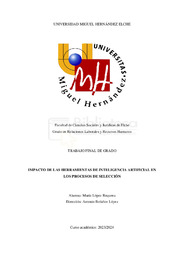Por favor, use este identificador para citar o enlazar este ítem:
https://hdl.handle.net/11000/33229Registro completo de metadatos
| Campo DC | Valor | Lengua/Idioma |
|---|---|---|
| dc.contributor.advisor | Bolaños López, Antonio | - |
| dc.contributor.author | López Requena, María | - |
| dc.contributor.other | Departamentos de la UMH::Ciencia Jurídica | es_ES |
| dc.date.accessioned | 2024-09-19T11:23:44Z | - |
| dc.date.available | 2024-09-19T11:23:44Z | - |
| dc.date.created | 2024-06 | - |
| dc.identifier.uri | https://hdl.handle.net/11000/33229 | - |
| dc.description.abstract | El presente trabajo de fin de Grado (TFG) tiene como objetivo examinar el impacto de las herramientas digitales y de la inteligencia artificial (IA) en los procesos de selección de personal. Para ello, se contextualiza la evolución de los recursos humanos y sus funciones, así como el desarrollo de la inteligencia artificial. se abordan definiciones clave y su evolución histórica. Se analizan las herramientas de Inteligencia Artificial disponibles para los procesos de selección y se exploran las expectativas futuras de estas tecnologías. Además, se incluyen casos reales de empresas que ya han implementado estas herramientas en sus procesos de selección. Especialmente después de la pandemia, ha aumentado la necesidad de automatización en el reclutamiento y selección debido al incremento de solicitudes de empleo online. Este TFG busca responder si es beneficioso emplear herramientas digitales en los procesos de selección. Para ello, también se incluye un caso de estudio de una empresa que ha desarrollado una herramienta de inteligencia artificial para sus procesos de selección, analizando la satisfacción de los reclutadores con dicha herramienta. En conclusión, este TFG demuestra que el uso de herramientas digitales y de inteligencia artificial en los procesos de selección de personal no es el futuro sino el presente de los recursos humanos. Además, el uso de estas herramientas puede ser altamente beneficioso siempre y cuando se implementen de manera adecuada y se realicen ajustes continuos para mejorar su funcionamiento. La satisfacción de los reclutadores y la eficiencia del proceso de selección son indicadores clave del éxito de estas tecnologías. A medida que la inteligencia artificial continúa evolucionando, es probable que se observe un aumento en su adopción en los recursos humanos, transformando la manera en que las empresas gestionaban tradicionalmente el talento y tomaban decisiones de contratación. | es_ES |
| dc.description.abstract | The objective of this final degree project (TFG) is to examine the impact of digital tools and artificial intelligence (AI) in personnel selection processes. To do this, the evolution of human resources and their functions is contextualized, as well as the development of artificial intelligence. Key definitions and their historical evolution are addressed. The Artificial Intelligence tools available for selection processes are analyzed and future expectations of these technologies are explored. In addition, real cases of companies that have already implemented these tools in their selection processes are included. Especially after the pandemic, the need for automation in recruitment and selection has increased due to the increase in online job applications. This TFG seeks to answer whether it is beneficial to use digital tools in selection processes. To this end, a case study of a company that has developed an artificial intelligence tool for its selection processes is also included, analyzing the satisfaction of recruiters with said tool. In conclusion, this TFG demonstrates that the use of digital tools and artificial intelligence in personnel selection processes is not the future but the present of human resources. Furthermore, the use of these tools can be highly beneficial as long as they are implemented properly and continuous adjustments are made to improve their operation. Recruiter satisfaction and efficiency of the selection process are key indicators of the success of these technologies. As artificial intelligence continues to evolve, we are likely to see an increase in its adoption in human resources, transforming the way companies traditionally managed talent and made hiring decisions. | es_ES |
| dc.format | application/pdf | es_ES |
| dc.format.extent | 65 | es_ES |
| dc.language.iso | spa | es_ES |
| dc.publisher | Universidad Miguel Hernández de Elche | es_ES |
| dc.rights | info:eu-repo/semantics/openAccess | es_ES |
| dc.rights | Attribution-NonCommercial-NoDerivatives 4.0 Internacional | * |
| dc.rights.uri | http://creativecommons.org/licenses/by-nc-nd/4.0/ | * |
| dc.subject | Inteligencia Artificial | es_ES |
| dc.subject | Recursos Humanos | es_ES |
| dc.subject | Selección de Personal | es_ES |
| dc.subject | Herramientas Digitales | es_ES |
| dc.subject | Procesos de Reclutamiento | es_ES |
| dc.subject | Artificial Intelligence | es_ES |
| dc.subject | Human Resources | es_ES |
| dc.subject | Personnel Selection | es_ES |
| dc.subject | Digital Tools | es_ES |
| dc.subject | Recruitment Processes | es_ES |
| dc.subject.other | CDU::6 - Ciencias aplicadas::65 - Gestión y organización. Administración y dirección de empresas. Publicidad. Relaciones públicas. Medios de comunicación de masas | es_ES |
| dc.title | Impacto de las herramientas de inteligencia artificial en los procesos de selección | es_ES |
| dc.type | info:eu-repo/semantics/bachelorThesis | es_ES |

Ver/Abrir:
López Requena, María.pdf
1,36 MB
Adobe PDF
Compartir:
 La licencia se describe como: Atribución-NonComercial-NoDerivada 4.0 Internacional.
La licencia se describe como: Atribución-NonComercial-NoDerivada 4.0 Internacional.
.png)